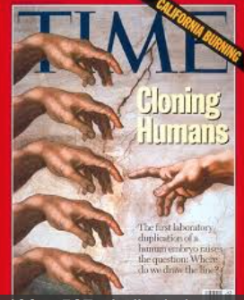Informative Review Paper (10%)
Although research papers are the primary sources of scientific knowledge, the outcomes reported in any single research paper usually do not completely resolve the motivating issue. This type of situation calls for a review paper or a review of literature that summarizes and synthesizes the findings and conclusions from the numerous research papers that have been published on a given issue. Although there are several subtypes of review papers, for this assignment you will be writing an informative review paper.
Informative review papers update readers about the state of knowledge on a focused topic or research issue without taking a position.
Essay Prompt
Imagine you are writing for the New York Times science section and tasks with writing an informative review on human cloning. At the same time, a biotech firm is under investigation for collaborating with Planned Parenthood in keeping aborted babies alive to harvest organs, causing public outcry and negative media attention on the ethics of cloning. Your goal is to try to minimize public concern by informing readers about the advantages of cloning, while also acknowledging the issues raised, and without taking a position. You must appear as objective as possible.
Audience: You are writing to a secondary audience unfamiliar with scientific terms, and you must use adaptive measures to convey complicated ideas.

Visual Images:
Visual images help convey complicated ideas or terms to readers. They also can help humanize controversial scientific practices or issues. A visual image representing some connection to your article’s purpose should be included in your paper.
Writing Guide
Format: 2-3 pages (not including the cover page or work-cited page); APA format with cover page. Visual image should be placed somewhere on the cover page, along with your paper’s title and your name/course name.
Opening: Your opening paragraph should resonate enough with the general readership to make readers want to know more about the topic. You might want to open it with a quote, story, or go directly into the issue being addressed. The main purpose of the opening is to get readers’ attention.
Background/Discussion: Because you are writing to a secondary audience unfamiliar with scientific terms, you must provide clear definition of terms and background information, issues and concerns, and the outcome to similar research on the topic. Then, move into your discussion informing readers about the topic without taking a position. It is equally imperative for you to alleviate your readers’ concerns about the ethics of cloning objectively; so, although you are technically taking a position as a science writer, it should not appear that you are.
Sources: Use Savulescu’s review paper, “The Ethics of Cloning,” to understand the definition of terms associated with cloning and the ethics involved. Morales’ article “Psychological Aspects of Human Cloning and Genetic Manipulation,” provides a more focused discussion on cloning. You should also use other articles and video interviews discussed in class. You are required to have a minimum of three sources taken from any of the readings or video interview/presentations discussed in class.
Conclusion: Your conclusion should do more than just summing up your argument. It should resonate with your readers in a way that will make them want to learn more about cloning.
Due Dates:
Sept 24 – First draft peer-review
Sept 26 — Final draft

